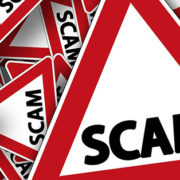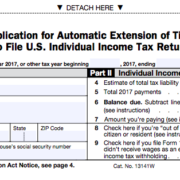IRS Issues Urgent Warning On New Tax Refund Scam
Just when you thought you’d read about all of the tax scams: The Internal Revenue Service (IRS) is warning taxpayers about a new – and growing – scam involving erroneous tax refunds being deposited into real taxpayer bank accounts. Then the crooks use various tactics to con taxpayers into turning over the funds. It’s a new twist on an old scam.
Here’s how it works. Thieves are using phishing and other schemes to steal client data from tax professionals. Then, using that data, they file fraudulent tax returns and use the taxpayers’ real bank accounts to deposit erroneous tax refunds. Finally, the thieves, posing as IRS or other law enforcement, call attention to the error and ask taxpayers to return the money to them.
Why are thieves going to such lengths? They know it is more difficult to identify and halt fraudulent tax returns when they are using real client data such as income, dependents, credits, and deductions. Additionally, it’s harder to track when criminals can find alternative ways to get the fraudulent refunds delivered to themselves rather than the real taxpayers – no more stealing checks out of mailboxes.
To get the funds from real taxpayers, thieves use various tactics. In one version, criminals posing as debt collection agency officials acting on behalf of the IRS reach out to taxpayers to say a refund was deposited in error, and ask the taxpayers to forward the money to their collection agency.
In another version, taxpayers who receive an erroneous tax refund receive an automated call with a recorded voice claiming to be from IRS; the caller threatens taxpayers with criminal fraud charges, an arrest warrant and a “blacklisting” of their Social Security number. The recorded voice then gives the taxpayer a case number and a telephone number to call to return the refund.
The kicker? Unlike previous variations on the scams, there is “proof” that the call from the alleged IRS representative is for real: The taxpayer typically does have a bogus tax refund in his or her bank account.
If this happens to you – and you do have a bogus tax refund in your bank account – here’s how the IRS wants you to return the funds and avoid being scammed:
If the erroneous refund was a direct deposit:
- Contact the Automated Clearing House (ACH) department of the bank/financial institution where the direct deposit was received and have them return the refund to the IRS.
- Call the IRS toll-free at 1.800.829.1040 (individual) or 1.800.829.4933 (business) to explain why the direct deposit is being returned.
If the erroneous refund was a paper check and hasn’t been cashed:
- Write “Void” in the endorsement section on the back of the check.
- Submit the check immediately to the appropriate IRS location listed below. The location is based on the city (possibly abbreviated) on the bottom text line in front of the words TAX REFUND on your refund check. Don’t staple, bend, or paper clip the check.
- Include a note stating, “Return of erroneous refund check because (and give a brief explanation of the reason for returning the refund check).”
If the erroneous refund was a paper check and you have cashed it:
- Submit a personal check, money order, etc., immediately to the appropriate IRS location listed below.
- If you no longer have access to a copy of the check, call the IRS toll-free at 1.800.829.1040 (individual) or 1.800.829.4933 (business) (see telephone and local assistance for hours of operation) and explain to the IRS representative that you need information to repay a cashed refund check.
- Write on the check/money order: Payment of Erroneous Refund, the tax period for which the refund was issued, and your taxpayer identification number (SSN, EIN, or ITIN).
- Include a brief explanation of the reason for returning the refund.
- Act quickly: Repaying an erroneous refund in this manner may result in interest owed to the IRS (remember, it’s not your money to begin with).
Here are the IRS mailing addresses to use based on the city (located on the check’s bottom text line in front of the words TAX REFUND):
- ANDOVER – Internal Revenue Service, 310 Lowell Street, Andover MA 01810
- ATLANTA – Internal Revenue Service, 4800 Buford Highway, Chamblee GA 30341
- AUSTIN – Internal Revenue Service, 3651 South Interregional Highway 35, Austin TX 78741
- BRKHAVN – Internal Revenue Service, 5000 Corporate Ct., Holtsville NY 11742
- CNCNATI – Internal Revenue Service, 201 West Rivercenter Blvd., Covington KY 41011
- FRESNO – Internal Revenue Service, 5045 East Butler Avenue, Fresno CA 93727
- KANS CY – Internal Revenue Service, 333 W. Pershing Road, Kansas City MO 64108-4302
- MEMPHIS – Internal Revenue Service, 5333 Getwell Road, Memphis TN 38118
- OGDEN – Internal Revenue Service, 1973 Rulon White Blvd., Ogden UT 84201
- PHILA – Internal Revenue Service, 2970 Market St., Philadelphia PA 19104
You can access this information online, as well, at Tax Topic Number 161 – Returning an Erroneous Refund, found here.
In addition to returning the erroneous tax return, the IRS encourages taxpayers to discuss the issue with their financial institutions. Since the bad guys have access to your bank accounts, there may be a need to close those accounts. Taxpayers receiving erroneous refunds should immediately should contact their tax preparers.
Of course, since tax season just kicked off, taxpayers who file electronically may find that their tax return is booted back because a tax return with their Social Security number has already been filed. In that event, follow the steps outlined in the Taxpayer Guide to Identity Theft. Taxpayers who are not able to file electronically should mail a paper tax return along with form 14039, Identity Theft Affidavit (downloads as a pdf), with a statement that they were victims of a tax preparer data breach.
The IRS warns that versions of the scam may continue to evolve. The number of potential taxpayer victims has already jumped from a few hundred to several thousand in just days. The IRS Criminal Investigation division is continuing its investigation into the scope and breadth of this scheme.
And one more time, just for good measure, say it with me: The IRS will not initiate contact with you by phone or email to discuss your account. When in doubt, assume it’s a scam.
SOURCE: https://www.forbes.com/sites/kellyphillipserb/2018/02/13/irs-issues-urgent-warning-on-new-tax-refund-scam-and-its-not-what-youd-expect/#53a620bef4b2
,













